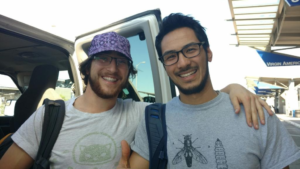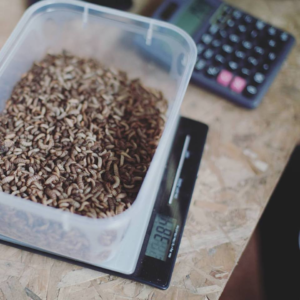When Eric Katz, was an undergraduate at the University of Michigan Ross School of Business, he did an internship on the Quinault Indian Nation reservation in Washington state. While there, he came up with an idea that would change the rest of his business school education, and his post-grad plans.
Katz was a natural resources specialist intern, and the Quinault Indian Nation is one of the largest producers of hatchery salmon. That summer he and a fellow intern, Viraj Sikand, became close friends. Sikand, from Kenya, told Katz he’d noticed a similarity between fish production on the reservation and fishing in his hometown: Both practices were unsustainable. The primary reason is that the commonly used fish meal is environmentally destructive.
Katz, who had just read an article about edible insects, had an idea: “What if you could replace the fish meal with animal feed?”
ORGANIC WASTE AND BLACK SOLDIER FLIES
When his internship was over, Katz and Sikand went their separate ways, Katz back to Michigan and Sikand to Brown University. But their conversation about edible insects didn’t end. You could say the idea “bugged” him so much that Katz began seeking funding for a sustainable startup that would produce commercial-grade feed to small farmers. He got it in the form of a small grant from Ross to do preliminary research, and he and Sikand began working on what would become Kulisha.
The company is based around organic waste and black soldier flies. Waste that would otherwise be disposed of is stored in shipping containers where insects feed on it. The insects grow, the waste is disposed of, and the bugs are processed into chicken feed.
“We have this organic waste that’s really inherently valuable, and it’s protein that’s wasted,” Katz says. “So these insects act as a storage vessel for that protein. We’re hoping to replace alternative protein sources, like soy protein, which needs a lot of land to grow, and fish meal, which is caught in overfished oceans.”
‘BEING IN SCHOOL WAS REALLY USEFUL’
Katz, who recently graduated, has been working on Kulisha for about two years now. He wasn’t planning to start a company while still in school, but he saw college as an opportunity to try a bunch of different things — including entrepreneurship.
“I didn’t even really know what entrepreneurship was,” he says. “But I felt like I had the time, and it turned out being in school was really useful.”
Katz and Sikand have so far raised about $200,000 for Kulisha, and Katz estimates that a third to half of the money came from Michigan grants. Some also came from Brown, and the rest from entrepreneurship competitions.
“My grades definitely suffered. But I think we were able to do it because it’s something we were really passionate about,” Katz says. “I would sacrifice my free time for it.”
It was a valuable supplement to his Ross education, as well. “I was able to tie a lot of that education back into what I was trying to do with Kulisha,” he says.
FROM NAIROBI TO AUSTIN
Katz and Sikand began operations in Nairobi, Kenya, where Sikand grew up. For his junior-year internship, Katz travelled there to set up Kulisha’s first location. Though the company has since moved to a shipping container model, initially it worked in a greenhouse.
“We thought starting Kulisha in Kenya would be a good opportunity to fill a gap in the market,” Katz says. “There’s a quickly growing aquaculture market, and no high-quality protein at a reasonable price.”
Ultimately they decided that the company might get a better start in the United States, where Katz and Sikand can work closer to their research partners. Now that they’ve both graduated, they’ll be moving Austin, Texas soon.
“The marketing campaign in Kenya was difficult,” Katz says. “Customers didn’t put as high a value on quality protein as we’d originally hoped, and we had to pay for the organic waste that we can get for free in Texas.”
MANY THINGS YET TO PROVE OUT
In Austin, they’ll be close to food and beverage producers, and they hope to soon put Kulisha shipping containers on-site at many locations. “We’re moving in June, and we want to start moving products by August. In the meantime, we’re funding the company with money we’ve raised through competitions,” Katz says.
In the long term, he hopes that Kulisha’s protein will have more applications than just fish and animal feed, and that it will be price competitive.
“There are a lot of things we have to prove out before we can build a successful model,” Katz says. “We’ll be trying to prove those things. But my dream would be to move a shipping container onto the site of a food and beverage processor in a major city.”
DON’T MISS A BUSINESS SCHOOL WHERE THE AMERICAN DREAM IS ALIVE & WELL OR TOP FEEDER SCHOOLS TO SILICON VALLEY














Questions about this article? Email us or leave a comment below.